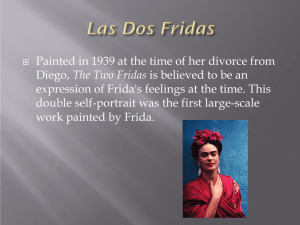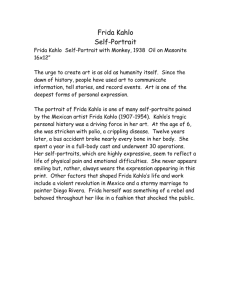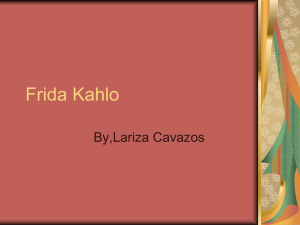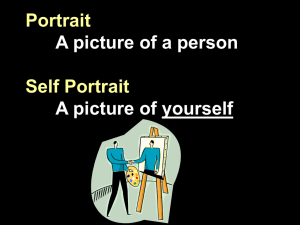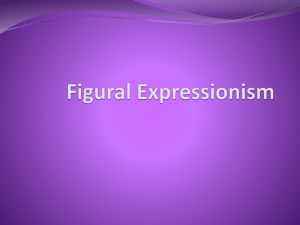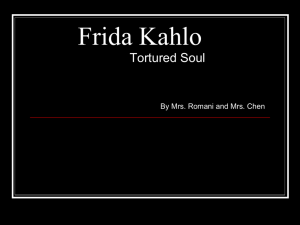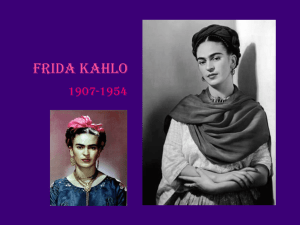Unit
advertisement
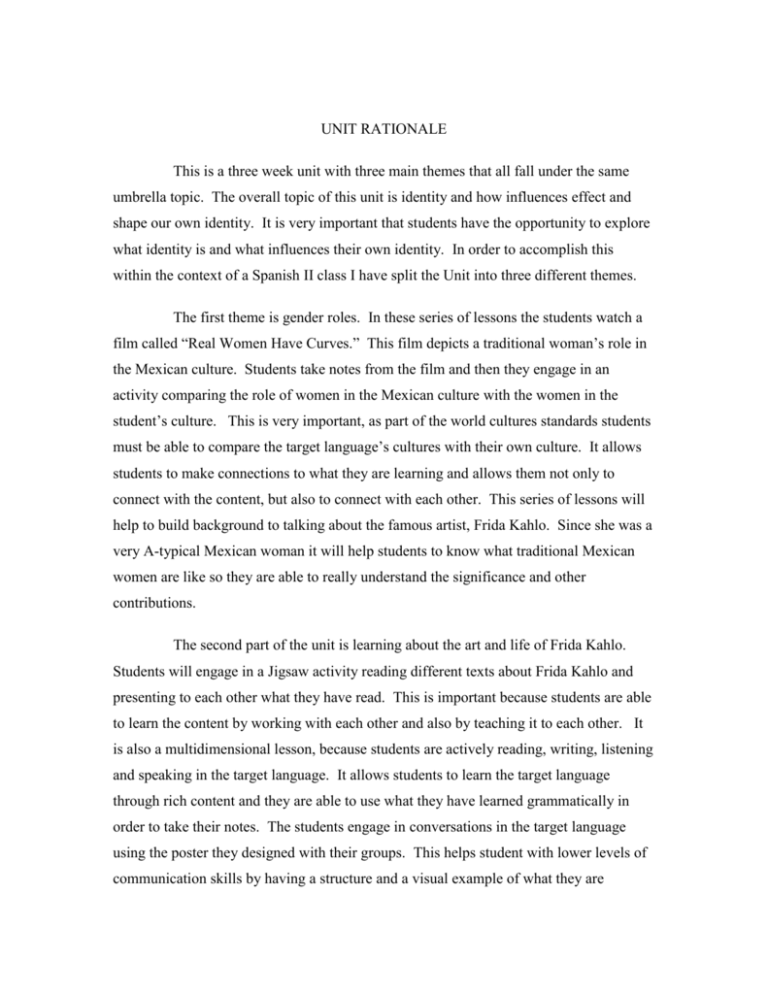
UNIT RATIONALE This is a three week unit with three main themes that all fall under the same umbrella topic. The overall topic of this unit is identity and how influences effect and shape our own identity. It is very important that students have the opportunity to explore what identity is and what influences their own identity. In order to accomplish this within the context of a Spanish II class I have split the Unit into three different themes. The first theme is gender roles. In these series of lessons the students watch a film called “Real Women Have Curves.” This film depicts a traditional woman’s role in the Mexican culture. Students take notes from the film and then they engage in an activity comparing the role of women in the Mexican culture with the women in the student’s culture. This is very important, as part of the world cultures standards students must be able to compare the target language’s cultures with their own culture. It allows students to make connections to what they are learning and allows them not only to connect with the content, but also to connect with each other. This series of lessons will help to build background to talking about the famous artist, Frida Kahlo. Since she was a very A-typical Mexican woman it will help students to know what traditional Mexican women are like so they are able to really understand the significance and other contributions. The second part of the unit is learning about the art and life of Frida Kahlo. Students will engage in a Jigsaw activity reading different texts about Frida Kahlo and presenting to each other what they have read. This is important because students are able to learn the content by working with each other and also by teaching it to each other. It is also a multidimensional lesson, because students are actively reading, writing, listening and speaking in the target language. It allows students to learn the target language through rich content and they are able to use what they have learned grammatically in order to take their notes. The students engage in conversations in the target language using the poster they designed with their groups. This helps student with lower levels of communication skills by having a structure and a visual example of what they are presenting. It allows students to practice their pronunciation and also helps students get use to hearing the target language. Another lesson related to this theme is a graffiti board lesson where students will look at some of Frida Kahlo’s artwork and will write on a poster board what they see in the paintings. They will have some guiding questions, asking them what they see and what kinds of things influenced these paintings. It is important that the students are able to analyze images and can then express what they see using the target language. They will also engage in a conversation with the whole class about what they see. Having informal conversations in the target language using simple sentence structures with some assistance is very important for the students’ second language development. The last step to this section involves the students writing a very brief biography using the preterit about Frida Kahlo. This lesson is focused more on using the grammar correctly, than learning new content. It also works as an assessment of the content they learned. If they are able to take the notes they have been creating from the beginning of the week to come up with the information for their biography of Frida. By having the students create a biography about Frida Kahlo they will have to use what they have learned about using the preterit tense as well as other grammar structures they have learned when writing in the target language. In this lesson, they learn not only the content but also are able to apply grammatical structures while creating the biography. The final part of this unit is the student creating their own autobiographies and self-portraits. The students read biographies and then create their own autobiographies. The students will engage in activities that help them communicate in the target language about what things have influenced them. They will create a brainstorming map of elements of their life they want to include into their autobiographies. This is important not only because it allows the students to improve their communication skills in the target language, through practice with oral production of the target language, but also through written work. As far as linking the content is concerned students learn that identity is a very important part of life and with the example of Frida Kahlo someone who was constantly expressing herself and also showing the world the events in her life that helped shape her own identity. Students will also engage in an art project by drawing their own self-portraits to go along with the biography they wrote. They will then present their biographies to the class, and will work on their presentations skills as well as oral language. The standards addressed by this lesson are communication standards allowing students to interpret oral, written, or signed language. There is also some content and cultural standards being met. One of the cultural standards is the ability to compare and contrast students own culture with target language culture this is being done in the first part of the unit. Students’ have many opportunities through out this unit to practice their writing using full sentences and also correct orthography. Which meets the structures part of the standards at stage II. Overall just about each lesson meets one cultural standard and also aims to meet either a communication standard or a structural standard to help the student with their writing or reading in the target language. All the students in this class are language learners and all the lessons scaffolds, which allow each student to understand and participate in the lesson. As an example one lesson where students are to communicate to each other what they see in some of Frida Kahlo’s paintings, students used sentence frames in order to communicate to each other in the target language. This is only one example of the many ways that scaffolds were used so students could understand and practice the target language. Overall this unit will make students more aware of differences and similarities between their culture and the target language cultures. It also teaches them the importance of learning about important figures in other cultures. This unit helps students understand that our influences in life, our culture, events in life, and how we define ourselves, shape the kind of person we are. Students are able to discover this through communication and written work in the target language, which in turn helps them become more fluent speakers of the target language. Unit Concept Map PLANNING BIMS Name: Angela Larocco School: Lindhurst High School Class: Spanish Grade Level: 9th-12th TEMA: El role de mujeres el la sociedad de México y el role de los mujeres en la cultura de los estudiantes. RAZONAMIENTO: Es importante que los estudiantes puedan comparar al cultura de la lenguaje que están aprendiendo con su cultura misma. Después de este lectura los estudiantes van a poder hablar sobre que hace sus madres en su familia. Con este practica los estudiantes van a poder comunicar sus ideas claramente y con mas facilidad. Es vital a los que están aprendiendo nuevos idiomas para también aprender la cultura del lenguaje nueva. ESTANDAR DEL CONTENIDO: Culture: 2.2 State similarites and differences in the target cultures and between students’ own cultures. Communication: 2.1 Engage in oral, written, or signed conversations. Estandar del lenguaje: Structures 2.1 Use Sentence level elements (morphology or syntax or both) to produce informal communications. OBJECTIVO DEL CONTENIDO Después que los estudiantes miran la película “Real Women have Curves” van a usar sus notas para llenar una diagrama Venn con tres frases en cada parte del diagrama Venn sobre los diferencias y los simularías entre los mujeres de la cultura mexicana y los culturas de los estudiantes. DEMANDA DEL LENGUAGE ACADÉMICO : VOCABULARIO DEL CONTENIDO Role de las mujeres, similitudes, el machismo, cocinar, limpiar la casa, coser, trabajar en el jardín, educación, FUNCIONES DEL LENGUAJE: Van a comparar y contrastar los dos culturas. También van a describir lo que vieron en la película que vieron la semana pasada. FORMAS DEL LENGUAJE (GRAMATICALES) : Van a escribir, y hablar sobre los diferencia y los similitudes de los dos culturas. OBJETIVO DEL LENGUAJE: Después que los estudiantes miran la película “Real Women have curves” los estudiantes van a llenar una diagrama Venn con frases completas en español sobre el role de la mujer en los dos culturas. Necesitan usar el correcto morfológica, y sintaxis en los tres frases para cada sección de la diagrama. EVALUACIÓN Lenguaje: Los estudiantes van a mostrar su conocimiento de cómo escribir frases en Español con la producción por lo menos tres oraciones en cada lugar del diagrama que usan morfológica y sintaxis correctamente. Contenido: Los estudiantes van a mostrar su conocimiento de la role del mujer en las dos culturas por el producción de seis oraciones explicando las diferencias y tres oraciones describiendo los similitudes. ESTRATEGIAS/TEQUNICAS Ser modelos, instrucción directa, Talking chips PROCEDIMEINTOS Iniciada1. Primero los estudiantes van a entrar y escuchar a los anuncios del día. 2. Luego empiezo la clase saludando los estudiantes y describiendo los objetivo para este clase. 3. Cuando termino de describir los objetivos, pregunto a los estudiantes a encontrar un par. 4. En pares los estudiantes van a compartir sus respuestas de la película que vieron la semana pasada. Usando “talking chips” para que todos los estudiantes comparten sus ideas. Con los “talking Chips” cada estudiante tiene un color de papel y tienen que poner su hoja de papel en el medio de la mesa y para hacer eso tiene que compartir uno de sus notas con su grupo. 5. Luego en sus grupos de 6 o 5 los estudiantes van a pensar en tres cosas que hace una mujer mexicana. 6. Cuando terminan de hablar los estudiantes van a escribir sus oraciones en sus papeles y una voluntario de cada grupo va a poner un oración de los tres en frente de la clase en la pisara. 7. Cuando llenan el lugar de los mujeres de México con oraciones individualmente van a llenar las similitudes y el parte de su cultura individualmente. 8. Por fin los estudiantes van a presentar una oración de cada parte del diagrama venn a su grupo y luego una persona de cada grupo va a decir su oración favorito a la clase. MATERIALES “Real Women Have Curves” –Video Diagrama Venn Example of Student Work Name: Angela Larocco School: Lindhurst High School Class: Spanish II Grade Level: 9th-12th Topic The life of Frida Kahlo. RATIONALE : It is important that the students learn to read in Spanish that they are able to comprehend written communication in the target language as well as are able to summarize what they have read. It is also an important part of culture for them to learn about an important figure in the Mexican culture and to have an opinion as well. These two things will help students’ communicate with natives by understanding their culture a little more and through practicing how to read and summarize in the target language. CONTENT STANDARDS Content standards Content Stage II2.1 g. Cultural and leisure-time activities, outdoor, recreational activities, music Culture Stage II 2.1 Demonstrate understanding of the roles that products, practices, and perspectives play in the culture. Language Standard: Communication Stage II 2.1 Engage in oral, written or signed (ASL) conversation 2.2 Interpret written, spoken, or signs (ASL) Language. 2.3 Present to an audience of listeners, Readers or (ASL) viewers. CONTENT OBJECTIVE: After the students read a paragraph about the life of Firda Kahlo they will make a poster of at least 5 important details from the paragraph, and they will then each take turns presenting their poster to the class as their class mates take notes. ACADEMIC LANGUGE DEMAND: CONTENT VOCABULARY Artista, autorretrato, modernismo, ocurrió, molde de cuerpo, paloma, elefante, matrimonio, puente, surrealista, sufrimiento, monos, pájaros, Frida Kahlo, Diego Rivera, Vocabulary for the instructions- Forman grupos, leen el párrafo, saquen apuntes FUNCIONES DEL LENGUAJE: Summarize a text and present their summaries. FORMAS DEL LENGUAJE (GRAMATICALES) : Students will read text, speak about their text, and write notes about other presentations, all in full sentences using the target language OBJETIVO DEL LENGUAJE: After the students read a paragraph and make a poster with at least 5 details about the paragraph they will share their poster with others and also be taking notes on the presentations using full sentences and conjugating the preterit verbs correctly. EVALUACIÓN Language :. Orally the students will produce full sentences using preterit verbs correctly. They will also as a group create a poster with five full sentences about the paragraph they read, and finally they will have their own set of notes about all of the presentations also written in the target language. Content: With the production of the student notes with 5 details from each group they listened to including their own presentation the student will show that they understood the content and they have taken notes about Frida Kahlo’s life. STRATEGIES AND TECHNIQUES: Jigsaw, active participation PROCEDURES: 1. First the students will come in and listen to the morning announcements. 2. Then the class starts by my greeting the class and the students copy the objective down on their chispa paper. 3. Then we introduce the objective and tell students that in their groups of 5 or 6 students they will receive a paragraph. Each group has a different paragraph and the color paper they are printed on differentiates them. 5. After I hand out the paragraph I will go over some vocabulary words that the students may need to know in order to understand the text. After we do this students are to read their paragraphs in their groups. 4. After they finish reading I will pass out the materials and explain the next activity. -When all of your memebers have finished reading each group will write at least five details from the paragraph on your poster. 5. I will give the students about 20 minutes to create their posters 6. When I see that most of the students have finished creating their poseters I will then introduce the next step. -Now that you have all finished your posters you will need to move to another table and every one in your new table must have a different color paragraph. -Once you have moved and are at a table where every one has a different paragraph the person who is at the same table as the poster must present their poster in Spanish. - you will have about 5 to 6 minutes to present your poster and then will rotate and the next person will share their poster in Spanish. 7. When all the students finish presenting please return to your seats and I will give you each a flash card so you can write down one new thing you learned about Frida Kahlo. MATERIALS Index card, Adapted text about Frida Kahlo, Graphic organizer EJEMPLOS DE LOS MATERIALES *I used the book Frida, a Biography of Frida Kahlo by, Hayden Herrera (1983) to write the following paragraphs for my students. Frida Kahlo Su niñez Frida Kahlo nació en Coyoacán, México. Ella nació el seis de julio en 1907. Luego ella cambió su fecha de nacimiento de 1907 a 1910, porque 1910 es el año de la revolución en México. Ella siempre pensaba que nació al mismo tiempo del modernismo. A los seis años Frida se enfermó con polio. Ella tenia tres hermanas, pero Frida era al hija favorita de su padre. En el año 1922 Frida entró a una escuela llamada la escuela nacional preparatorio de México. Ella estudió mucho pero también su papa le enseño mucho del arte. Frida era una persona que pensaba muy independiente a los demás. Frida y su salud Frida tuvo un accidente muy grave en un autobús cuando ella tenia dieciocho años. El accidente ocurrió por la tarde en septiembre 17, 1925, el día después de la celebración del aniversario de la independencia de España. Ella vivó con mucho dolor por todo su vida. Después del accidente Frida tenia que estar acostada por un mes con un molde de cuerpo. Ella siempre tenia muchos vestidos con sus doctores y ella tenia 36 sugerías. Por culpa de su accidente Frida no podía tener hijos porque el accidente destruyo los órganos necesarios para tener niños. En el año 1953 Frida perdió su pierna derecha por su enfermedad. Ella se murió en Julio el 13 en el año 1954. Frida y Diego Frida Kahlo conoció a Diego cuando ella tenia 15 años, a ella siempre le gusto Diego desde muy joven. Diego era un pintor muy famoso en México. A Diego le gustaron las pinturas de Frida, él siempre pensaba que el arte de Frida era muy bonita. Diego Rivera tenia 21 años más mayor que Frida. En Agosto de 1929 Frida y Diego se casaron. Los padres de Frida no querían a Diego, porque el era una comunista y también era divorciado. La mama de Frida decía que el unión de Frida y Diego era como una unión entre una palomo y un elefante. Frida y Diego Diego tenia muchos amores por todos lados y también tenia una esposa de otro matrimonio. Al principio Frida no quería Lupe Marín la primera esposa de Diego, pero con tiempo las dos mujeres eran amigas. Lupe enseño a Frida como cocinar la comida favorita de Diego. Frida y Diego tenían problemas matrimoniales, y por eso vivieron en dos casas diferentes. Las casas de Diego y Frida estaban conectados por un puente. Frida siempre quería tener hijos pero Diego nunca quería y también su salud era mal entonces ella no podía tener hijos. Ella se sentía muy triste porque nunca tuvo hijos en su vida. Frida y Diego se separaron muchas veces. Frida le decía que tenia dos accidentes uno con un autobús y el otro fue Diego. Frida y su arte Frida siempre expresó su identidad con su ropa y su arte. Frida era muy tímida con su arte, y no se vendió su arte tanto como la de su marido Diego. Frida siempre tenia el sueño de tener una exhibición en su propio país. Ella viajó a Paris para uno de sus exhibiciones y también tenia exhibiciones el los Estados Unidos. Frida era una surrealista, ella dice que ella solo pinta lo que ocurre sin ninguna consideración. Ella pinto muchos autoretratos, porque dijo que su mejor amiga era si misma. Frida y su arte Frida y Diego vivieron algunos años en Los Estados Unidos, pero a Frida no le gusto mucho. El 1930 ella y Diego se fueron a San Francisco, también fueron a Nueva York, para que Diego pudiera pintar. Ella le gusto pintar autoretratos junto con sus animales, como sus monos y unos con sus pájaros. Frida siempre expresó sus sentimientos en sus pinturas. Muchos de ellos son bien gráficos y con mucho sufrimiento pero es porque en la vida de Frida ella sufrió mucho, emocionalmente tal como físicamente. Graphic Organizer: Name: Angela Larocco School: Lindhurst High School Class: Spanish II Grade Level: 9th-12th TEMA : El Arte de Frida Kahlo RAZONAMIENTO : Es importante que los estudiantes aprenden sobre el arte de Frida Kahlo porque ella era una figura muy influenciada en la cultura mexicana. Es importante que los estudiantes conocen algunos figuras famoso de las culturas hispanohablantes para poder comunicarse mejor con hispanohablantes. También es importante que los estudiantes practican de analizar cosas y expresar lo que analizan en español para practicar oralmente y en su escritura. ESTANDAR DEL CONTENIDO: Estándar del contenido: Cultures Stage II 2.1 Demonstrate understanding of the roles that products, pratices, and perspectives play in the culture. Estándar del lenguaje: Communication: Stage II 2.1 Engage in oral, written, or signed (ASL) conversations Communication: Stage I 1.4 List, name, identify, and enumerate OBJECTIVO DEL CONTENIDO Después que los estudiantes aprenden los estructuras de los oraciones y los analizan una pintura del libro paso paso dos, en grupos los estudiantes identifican una cosa que ven en cada pintura, un sentimiento, y algo que esta en común en todos las pinturas de Frida Kahlo. DEMANDA DEL LENGUAGE ACADÉMICO : VOCABULARIO DEL CONTENIDO : Ceja unida, ciervo, sangre, emoción, árbol, mono, tijeras, silla, traje, animales, pájaros, monos, en su frente, bigote, pello, lágrimas, tres ojos, FUNCIONES DEL LENGUAJE: Analizar y describir los pinturas. FORMAS DEL LENGUAJE (GRAMATICALES): Oraciones completas, Usando estructuras de oraciones los estudiantes oralmente expresan lo que ven en los pinturas. OBJETIVO DEL LENGUAJE: Después que los estudiantes aprenden los tres estructuras de oraciones, en grupos de 5 o 6 los estudiantes expresaran lo que ven en las pinturas y como las pinturas le hacen sentir. Cuando la clase termine su discusión oralmente la clase va a analizar otras pinturas de Frida Kahlo y usando los estructuras de los oraciones tendrán que comunicar lo que ven usando oraciones completas. EVALUACIÓN El contenido- Los estudiantes demostrarán su conocimiento de las pinturas de Frida Kahlo por el producción oral en donde los estudiantes expresan que analizaron en los pinturas. También con el producción de los dibujos y sus calificaciones escritos en el cartel. El lenguaje- Los estudiantes demostrarán sus habilidades de comunicarse usando los estructuras de los oraciones para describir las pinturas usando oraciones completas. ESTRATEGIAS/TEQUNICAS Sentence frames, Numbered Heads Together, Graffidi Boards, PROCEDIMEINTOS 1. ¡Bienvenidos clase! Al principio de la clase cuando toqué la campana los estudiantes entren a la clase y se sesentén en sus sillas apropiadas. 2. Al principio la clase escucha a los anuncios de la manaña, y cuando hacen el pledge la maestra pide a los estudiantes que les paren para ser el juramento. 3. Después que el pledge la maestra dice, “Buenas días clase” y los estudiantes repitan “Buenas Días señorita XXXXX” 4. Cuando terminan el saludo, la maestra introducirá el tema; el arte de Frida Kahlo y introducirá los objetivos para la lección. 5. Después la maestra pide que los estudiantes agaren sus libros de texto y que vayan a la pagina 154 en donde encuentran unas pinturas que van a analizar. 6. Luego la maestra introducirá los tres estructuras de oración que los estudiantes usarán para describir las pinturas en una actividad comunicativa. 7. Cuando la clase aprenden las estructuras de oración practican los oraciones con su grupo encontrando cosas que ven en las pinturas. 8. Después que practican en sus grupos la maestra les da un numero para cada estudiante. 9. Luego con un dado la maestra pide que los estudiantes con el miso numero del dado comparten algo que ven en la pintura usando uno de los estructuras de oración. 10. Ya que hacen el actividad “Numbered Heads Together” tres veces los estudiantes guardan sus libros. 11. Despues que guardan sus libros la maestra les dan copias de pinturas de Frida Kahlo. 12. En sus grupos los estudiantes ortra vez comparten lo que ven en los pinturas con su grupo usando los estructuras de oración. 13. Ya que han tenido este practica hablando oralmente los estudiantes van a dibujar y escribir en sus carteles grandes que están en sus mesas lo que observan en las pinturas. 14. Los estudiante hacen un Gaffitti Board con diferentes objectos y temas que ven en los pinturas que rodean a grupo a grupo. Photos of Sentence Frames My Block Plan Lesson #1 La introdución de el tema Content Objective- After watching the movie Real Women Have Curves student will individually take notes about the movie and be able to name at least 5 different aspects of the role of a woman in the Mexican culture. Language Objective: After watching the movie Real Women Have Curves student will individually take notes about the movie and be able to write 5 full sentences in the target language about the culture. Strategies- Graphic Organizers, the use of visuals, and ralia in order to make content accessible to students. Description- Students will be watching a movie and as they watch the movie they will be filling out a graphic organizer answering questions about the different women’s roles in the movie. Assessment- By the production of 5 sentences students will show there understanding of the content and also show that they are able to Lesson #5 Content ObjectiveStudents will present their posters they made in the previous lesson to the remanding members, allowing each student to share at least 5 things they each learned from reading their paragraphs. Language Objective: Student will orally present using full sentences and using the correct conjugations of the preterit verbs sharing at least 5 things they learned from reading their paragraph in the target language. Strategies- This lesson is the continuation of a Jigsaw activity. Description: This lesson is a continuation of the last lesson where students are to finish the jigsaw lesson and then at the end students send a representative who will come up in front of the class and share one thing they learned about what they read. Assessment – Students will show that they learned at least 5 things about the paragraph they read by the production of their poster. And will also be orally assessed making sure they are speaking in full sentences as well as using the right verb tenses. Lesson #9 Content Objective- After the students brain storm as a whole group the important aspects of Frida Kahlo’s childhood the students will write a five-sentence paragraph about her childhood. Language Objective –After a review of some of the irregular preterit verbs students will individually write a five-sentence paragraph using the preterit verbs about Frida Kahlo’s childhood. Strategies- Students will be learning the verb tense by putting it to music using the “Are you Sleeping? “ song. There will be direct instruction, Numbered Heads Together, and individual work time. Description - Students will learn four new irregular preterit verbs, by putting them in to a song called “Are you Sleeping?” Then will then present the song to the class and when they finish they will create a graphic organizer with at least five details about Frida’s childhood. The students use their notes from the previous week in order to create a fivesentence paragraph. Assessment- Students will show that they know how to conjugate the verbs by the production of the song and the oral presentation of singing the song. They will also show their understanding of the content Lby producing a 5-sentence paragraph about Frida’s childhood. This will also help students show their writing ability by conjugating the verbs in their paragraph and also through the production of their writing. Lesson #2 Lesson #6 Lesson #10 Content Objective: After Content Objective- After Content Objective- After finishing the movie Real students watch clips from an over view of the threeWomen Have Curves, the different films about Frida paragraph assignement the students will be able to answer Kahlo they will student will go to the library questions at 100% accuracy individually be able to and individually type and about the woman from the name at least 5 things they look for new information to movie. learned from the film about add to their paper. Language Objective: Student her life. Language Objective: will be able to listen and Students will be producing Language Objectiveunderstand some parts of the Students will watch clips rough draft bibliography movie where the speakers are from different films about using the preterit verbs in solely speaking in Spanish the Frida Kahlo and they will order to write about Frida’s target language. As the end of then produce at least 5 life. the period students will be complete sentences about Strategies: Direct asked to share any new things they learned about instruction, students will vocabulary words they learned Frida Kahlo. work with computers and from the movie also be allowed to research Strategies: Visuals, realia, some direct on the internet more about Strategies: Exit slips, realia, instruction. Group and visuals to help students Frida Kahlo. discussions. connect with content. Description- This is a Description- Students will work day scheduled in to Discription- Students will watch different clips, one share with their groups what the unit for the students so from youtube, which is a they understood about the there are not real activities old film of Frida and Diego during this lesson students movie and what the different together, the other clips are have their assignment and roles the women in Mexican from the movie Frida. The notes and are in the library culture have appose to their own culture. At the end of the students will take notes as using the computer as period students will share new they are watching the clips resources in order to help and are to tell me at least 5 them type their papers. culture they learned and also new things they learned new vocabulary they learned Assessment- By the about the artist. They from the movie. production of a rough draft could write about events in students will show their Assessment- By the production of the exit slips students will share one thing they learned about the content as well as one new vocabulary they learned by watching the movie. Students will also show their understanding of the women’s role by filling out a graphic organizer with questions about the movie on it. Lesson #3 Content Objective- After the students have watched the movie, compared and taken notes the students will then create a Venn Diagram comparing the Women in the Mexican Culture to the women in their own culture naming 6 differences and 3 similarities. Language Objective: After the students watch the movie they will write 6 differences and 3 similarities between the two cultures in the target language practicing their writing in full sentences. Strategies- Group working, Graphic Organizer Venn Diagram, talking chips Description: Students will use the a Venn Diagram in order to compare the two cultures, they are encourages to work together with other students of their own culture to help generate ideas of how the two cultures are alike or different. Students will then also use talking chips in order to share out some of their own her life they learned about from the film Frida, or they could share observations from the youtube clip about how she dresses or looked in real life. Assessment- By the production of the five sentences about what hey learned about Frida from the films student will show their writing as well as understanding of the content. Lesson #7 Content Objective- In groups of 5 or 6 students will analyze different paintings of Frida Kahlo by using sentence frames the students will share with the class using Numbered Heads Together to orally express what they see and feel when looking at the paintings. They will also individually share out to their small group using sentence frames to talk about one of the paintings. Language Objective: Students will be analyzing paintings from Frida Kahlo and will use sentence frames to communicate with the class what they see and how the paintings make them feel. Strategies: Sentence frames, Numbered Heads Together, Group work Description: Guided practice: students will learn each of the sentence frames and using a painting in the book they will discuss content knowledge of Firdas live as well as show at what level their writing is. They will use the preterit verbs to describe Fridas life. They will be assessed on how well they incorporate both the grammar and content. Lesson #11 Content Objective- After students finish their rough drafts they will be able to edit their peers papers by being assigned to look for at least one of the requirements from the assignment sheet and making comments on their peers papers. Language Objective: Students will be each giving an element of the assignment to look for as they read their peers papers and check to make sure each student has met the requirements. Students look for conjegations of the verbs, complete sentences, subject verb agreement, gender agreement, etc. Strategies: Peer editing, Group work, Round robin editing session. Description During this lesson the students will engage in an editing activity were they will pass their papers around to their group members. In their groups findings to the rest of the class. Assessment: By the production of the Venn Diagram the students will show not only their understanding of the cultures and the movie, but also they will be able to show their writing skills and practice writing in complete sentences. what they see in the target language by using the sentence frames. Numbered Heads Together- as a class different representative from each group will share with us what they have seen in the paintings. As students finish they will then receive a different painting and they will talk amongst their own group using the sentence frames to speak in the target language about the painting they have. Assessment: During this lesson students will be assessed on their oral production of the language. They will also be assessed on their ability to choose a sentence frame and explain what they see or feel by looking at the paintings. each student is assigned one element of the assignment to look for and make sure their classmates are meeting the requirements. Assessment: Through the production of student notes on the students rough drafts students will be assessed on weather they read and correctly edited their peers papers both for grammar as for content. Lesson #4 Content Objective- In groups of 5 or 6 students will read a paragraph about the life of Frida Kahlo. Each group will have a different paragraph then students will create a poster with at least 5 key points of the paragraph in the target language. Language Objective: Students will read in their group one paragraph about a point in Frida Kahlo’s life and they will have to write five complete sentences on a poster. Strategies: beginning of a Jigsaw lesson. Direct instruction. Description - Students will participate in a Jig saw where they need will read their paragraph and then they will then all mix up so that one student from each group is sitting with each other. They will then rotate around the room as they take turns presenting their posters. All the students will share, take notes, and listen to each other. Assessment: By the production of the students’ posters they will show their understanding of the content being the paragraph they read about Frida Kahlo and also will be able to show as a group their understanding of grammar by producing five complete sentences. Lesson #8 Objective- After students analyze some pieces or art by Frida Kahlo the students will draw and label different elements of what they see in the paintings. They must draw one element for each painting; there will be 6 paintings in total. Language Objective: Students will anaylize some paintings and then they will draw and label at least 6 different characteristics from the paintings. Strategies: Graffiti Board activity. Description - The paintings will rotate around the classroom and students will engage in a graffiti board activity where each student has his or her own area to draw and label what they see in the paintings. Assessment- By the production of a graffiti board with different images and labels students will show that they were able to identify different elements of Frida’s Art. Lesson #12 Objective- After the student learn about Frida Kahlo and her self-portraits the students will brainstorm at least 5 of their own influences that they will include in their own selfportraits. Language Objective: After students draw their posters and color them they will then give a one to two minute presentation to the class about their portrait in the target language. Strategies: Individual work time, direct instruction. Description- Students will draw a self portrait, with at least five other images either drawings or pictures of other influences or events in their life that help to make them who they are. As they take a few days to work on this they will then stand in front of the class and individually present their posters in the target language. Assessment- By the production of the students oral presentation students will show that they included at least 5 influences in their life and also will show their oral communication skills to speak in full sentences. Assessment Procedures Narratives In this unit there are many on going assessments taking place through out the whole unit. The first assessment that is done is a Venn diagram where the students are to state three differences and three similarities about the women in the Mexican culture and those in the students’ own culture. This assessment not only shows that the students understood the content of the film showed to them the previous day but also shows their ability to use full sentences in the target language (Spanish). The next assessment is filling out their graphic organizers as they take notes on their peers’ presentations of their paragraphs that they read in the jigsaw activity. This assessment assess not only the information the students gain from their peers presentations, but the presentations them selves are an assessment of the students oral language. As the students present to their group the teacher rotates around the room listening in to hear the students as they present their posters on their individual paragraphs they wrote. All of this is done in the target language in order to help students practice the target language by speaking, listening, and writing. The students then are assessed on how descriptive they can be in the target language by having the students analyze art of Frida Kahlo and draw and label different elements of her art on their own large sheet of paper. After having students read and create their poster in the pervious lesson it was through my assessment of their oral language that they had a hard time producing oral language with out writing things down first. Students were not really communicating with each other rather they were restating a already written phrase. In order to help the students build more natural communication they were giving sentence frames to use as they looked at the paintings in order to express what they saw and felt. In this activity students used the present tense as well as the preterit in order to orally state what they saw and felt by looking at the paintings. Also assessment of the pervious days was used in order to adapt and change instruction. The students in the analyzing art lessons were assessed by the production of their Graffiti board where students drew and labeled the different elements of each painting, we also had oral assessment where we used Numbered Heads Together in order to have different people from each group share their observations using the sentence frames. The culminating assessment for this Unit is for the students to produce a threeparagraph biography about Frida Kahlo. As part of this assessment the students are to write one paragraph about her childhood, a second paragraph of their choice they could write about her art or her relationship with Diego est., and the third paragraph is where the students are able to express their own opinion about Frida. Students are told that they must include the verbs in the past that they learned through out the lesson. This paper is a good assessment of the content that the students have learned and through different editing activities it also helps students improve their writing in the target language. Through this assessment I was able to see what types of common mistakes the students make in their writing and then for their warm ups I had students correct sentences that they wrote in their papers that had many of the common whole class mistakes. I notice that students often missed written accents even though they had gone over that many of the preterit verbs, which once conjugated, have written accents. As a class we went over once again how to write the conjugations and I also explained to the students and unlike in English in Spanish they have accents and if you do not use them when they are needed then the word is considered to be written incorrectly or may have a different meaning. It was because of this assessment that I was able to give this type of whole class feed back on their writing. The students were also giving a rubric to fill out where they graded their own papers and had to put a reason for each score as well as suggestions for themselves as to how they can improve their papers. This allows students to know how they are being grades and it also gives students the opportunity to justify the grade they think they earned as well as help them think of ways they could improve their writing in the target language. After the students evaluated themselves I then used the same rubric and evaluated the students. On the rubric I also gave the students their scores and explained the reasoning for each score, and also included some suggestions for the students to improve their writing. This is very helpful I feel to the students because not only to they know why they are receiving the grade they got, but they are also getting suggestions and things to work on or focus on for their next writing assignment. Here are some examples of Students Rubrics and my rubric. The first example is a student who did very well on the paper and the second is one that needs improvement. Here you are able to see the ability to share with the students what they need to work on as well as what they did well on. We can also see how the students are able to evaluate their own learning. The first one is student A’ self evaluation, then it is the teacher evaluation of student A , after that is student B’s self evaluation and finally the teacher evaluation of student B. Student A is the student who excelled and student B is the student who needed to improve. Student:A Self Evaluation Student A Teacher Evaluation Student B Self-Evaluation Student B Teacher Evaluation Bibliography Atlas, M. R, Brown, E. T, LaVoo, G. (Producer), & Cardoso, P. (Director). (October 18th, 2002) . Real Women Have Curves (Motion Pictures) . United States: HBO Films This film is about a Mexican American family and it depicts the struggles mainly of Mexican American women. This was used in the class in order for the students to get a sense of what is expected of a traditional woman in the Mexican culture. Green, S (Producer), & Taymor, J (Director) . (August 29, 2002) . Frida (Motion Picture) . Canada, Mexico, and United States: Miramax Films. This film is a documentary about Frida Kahlo’s life and is a wonderful depiction of her relationship with Diego. I used only parts of this movie due to the grave content I had to skip many scenes, but it was effective in showing the students what Frida was like. It also helped show her relationship with Diego as well as created an image of how much she suffered through out her life. Herrea, H. (1983) . Frida, a Biography of Frida Kahlo: New York: Happer & Row. This book is a biography about Frida Kahlo written in English. I used this book in order to get information about Frida Kahlo’s life so I could create my own text in the target language at a level of understanding for all of my Spanish learners.
